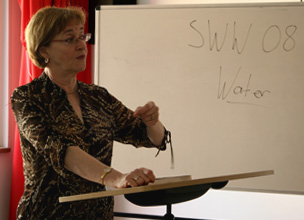
On Monday 5 May 2008, ECLA welcomed Maude Barlow to deliver the opening lecture of the Annual Conference. Maude Barlow is a human rights activist and author of several books, the most recent being Blue Covenant: The Global Water Crisis and the Coming Battle for the Right to Water. Based on the research included in this book, Barlow lectured on the global issue of water scarcity, which leaves one billion people without access to drinking water and more than two billion without adequate sanitation. Barlow’s analysis establishes connections between this water shortage and the global trend towards water privatization.
Co-founder of the organization Blue Planet Project,whose avowed aim is to stop the commodification of the world’s water, Maude Barlow made an incisive distinction in her lecture between those political groups which consider water a commodity, and activists, including herself, that advocate a human right to water, and therefore consider it as a commons property.
The issue of the human right to water ran throughout Maude Barlow’s lecture and is derived from the definition which has been accorded to it by the UN. In 1948, when the General Assembly adopted the text of the Universal Declaration on Human Rights, water was implicitly incorporated through other human rights, but not explicitly formulated. In 2002, to mark the UN International Year of Freshwater, the Committee on Economic, Social and Cultural Rights adopted General Comment No. 15 in which water is recognized, not only as a limited natural resource and a public good but also as a human right. With the exception of Somalia and the United States, all the UN member countries worldwide signed this document which recognized this right, which, however, has no force of law.
Maude Barlow’s concern for the future of water, she explained, includes an explicit formulation of a human right to water, an ambitious solution to which would be the creation of a global covenant on water. Such a covenant would be made up of more specific, component covenants, including covenants to protect water conservation, water justice and water democracy. For Barlow, therefore, the human right to water is situated within the broader context of concern with global and economic equality. Barlow doubts, however, that one person or organization would be able to design the ‘blueprint’ to realize this ‘dream’.
Maude Barlow’s discourse incorporated well-documented facts, such as global water conflicts, e.g. in China and Tibet, and the involvement of international organizations such as the World Bank and the United Nations in promoting the water privatization model. Personal examples, extracted from her extensive travels for field-research purposes, enriched and refined the message of these data. This research has brought her into contact with the communities and peoples of Africa and Latin America, who, aware of a human right to water, are now fighting for it.
Barlow’s language of a right to water does not rely solely on the entailment of this right in General Comment No. 15, but draws further on a philosophical perspective, rooted in the terms of religious or customary law. Although the struggle against the global water privatization trend represents a challenging task, Maude Barlow’s lecture shed light on the importance of thorough investigative work when addressing essential global issues such as the legitimacy of a human right to water.
Maude Barlow is a Canadian author and activist, head of the advocacy organization The Council of Canadians. She is also director of the International Forum on Globalization and co-founder of the Blue Planet Project organization. Her publications include: Blue Covenant: The Global Water Crisis and the Fight for the Right to Water (with Tony Clark); Blue Gold: The Battle against Corporate Theft of the World’s Water; and Profit Is Not the Cure: A Citizen’s Guide to Saving Medicare.
Article by by Livia Marinescu (’08, Romania)
